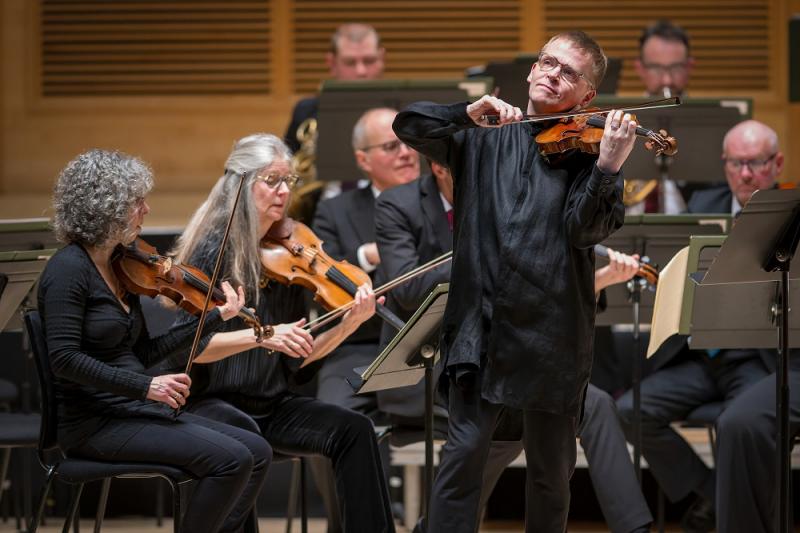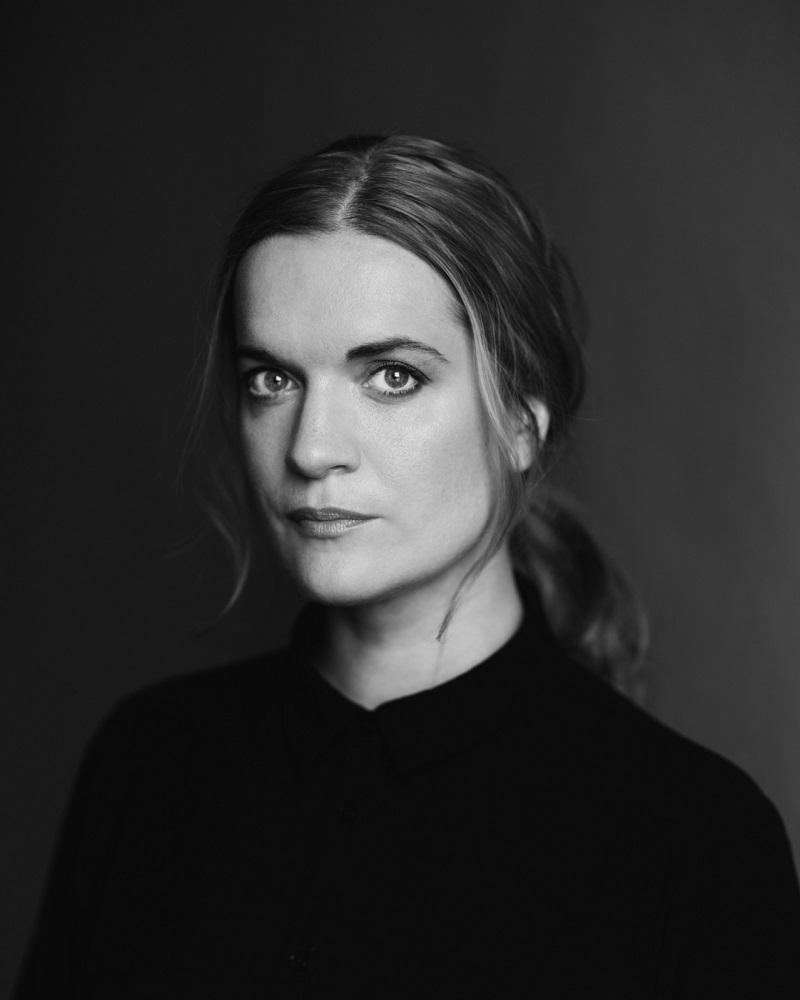Hughes, SCO, Kuusisto, Queen’s Hall, Edinburgh review - Clyne shines, Grime fragments | reviews, news & interviews
Hughes, SCO, Kuusisto, Queen’s Hall, Edinburgh review - Clyne shines, Grime fragments
Hughes, SCO, Kuusisto, Queen’s Hall, Edinburgh review - Clyne shines, Grime fragments
Playing and programming admirable, but this concert bulged at the seam

Most concert promoters will tell you that contemporary music tends to be, to put it politely, a tricky sell, which is one of the reasons why it’s most often programmed alongside Beethoven or Tchaikovsky. A whole programme of the stuff tends to be box office suicide, so it’s almost never done.
It’s a testament to something or other, then, that not only was (almost) everything in this Scottish Chamber Orchestra programme written in the last 50 years, but that they got a remarkably good audience for it; certainly nothing smaller than another regular season concert. What’s their secret?
 Some of it must have been the man in charge. Finnish violinist Pekka Kuusisto is a regular guest with the Scottish Chamber Orchestra (main picture), and his two or three concerts a year are always hot tickets. That’s partly because he’s a terrific violinist, but also because he conducts the orchestra so sympathetically, and he chooses programmes that forge links across genres and forms in a way that both welcomes the newcomers and challenges the regulars. The SCO’s audiences trust him, therefore, and if he has chosen a contemporary programme then they’ll happily follow him into it.
Some of it must have been the man in charge. Finnish violinist Pekka Kuusisto is a regular guest with the Scottish Chamber Orchestra (main picture), and his two or three concerts a year are always hot tickets. That’s partly because he’s a terrific violinist, but also because he conducts the orchestra so sympathetically, and he chooses programmes that forge links across genres and forms in a way that both welcomes the newcomers and challenges the regulars. The SCO’s audiences trust him, therefore, and if he has chosen a contemporary programme then they’ll happily follow him into it.
Having said that, this programme felt a little like a rootle around in the store room. Kuusisto had two UK premieres in his goodie bag, one from Anna Clyne (pictured above right by Christina Kernohan) and the other from Helen Grime, and he must have chosen the Nordic works that went with them: Erkki-Sven Tüür’s Lighthouse and Rautavaara’s Cantus Arcticus. All well and good, I suppose, though the programme would have been fine without the folk tunes played by Kuusisto and Aidan O’ Rourke. They fiddled their way through some of the original folk tunes that Clyne used in Time and Tides, her new pieces, and it was fun both hearing their musicianship and seeing them flash sparks off one another. It felt expendable, though, a bit like throwing paint at the wall simply because you had some lying in the back of the cupboard.
It was beautiful paint, though. O’Rourke and Kuusisto drew the audience into the great time they were clearly having together, and their folksy playing was a useful introduction to Clyne’s piece, which took each tune as a starting point and often moved to surprising places from it. That could be eerie, half-heard glissandi from the back desk of the orchestral violins, or the tune steadily decomposing and then coming together again. She’s such a terrific talent, and she handles her musical material with such confidence that she surely qualifies as one of the top composers we have around today.
 I’d normally say the same of Helen Grime, but I struggled to love her new song cycle, It Will Be Spring Soon. Ruby Hughes (pictured left by Phil Sharpe), the soprano for whom it was written, sang it with terrific focus and vocal concentration, but the music felt very bitty, almost fragmentary, like looking at a big picture through a microscope so that only certain components of it came into focus at any one time. The string writing for the first two songs was constantly shifting, flickering in its ceaseless movement, which made it difficult to cohere as a unit. Some resolution came in the final song, which was slower-moving, suggesting depth that hadn’t previously been there, but it was a bit hard to love as a whole.
I’d normally say the same of Helen Grime, but I struggled to love her new song cycle, It Will Be Spring Soon. Ruby Hughes (pictured left by Phil Sharpe), the soprano for whom it was written, sang it with terrific focus and vocal concentration, but the music felt very bitty, almost fragmentary, like looking at a big picture through a microscope so that only certain components of it came into focus at any one time. The string writing for the first two songs was constantly shifting, flickering in its ceaseless movement, which made it difficult to cohere as a unit. Some resolution came in the final song, which was slower-moving, suggesting depth that hadn’t previously been there, but it was a bit hard to love as a whole.
No such problems for Tüür’s Lighthouse, which contrasted big blocks of chords with dashing lines of string sound, or Rautavaara’s Cantus Arcticus, which sounded hypnotic in its beauty. Kuusisto beautifully judged its combination of stasis and movement which, like nature itself, seems to speak of eternity, particularly in those ceaselessly trilling winds that flow in and out of the slower music, and the string playing throughout was warm enough to melt a polar ice cap.
rating
Explore topics
Share this article
The future of Arts Journalism
You can stop theartsdesk.com closing!
We urgently need financing to survive. Our fundraising drive has thus far raised £49,000 but we need to reach £100,000 or we will be forced to close. Please contribute here: https://gofund.me/c3f6033d
And if you can forward this information to anyone who might assist, we’d be grateful.

Subscribe to theartsdesk.com
Thank you for continuing to read our work on theartsdesk.com. For unlimited access to every article in its entirety, including our archive of more than 15,000 pieces, we're asking for £5 per month or £40 per year. We feel it's a very good deal, and hope you do too.
To take a subscription now simply click here.
And if you're looking for that extra gift for a friend or family member, why not treat them to a theartsdesk.com gift subscription?
more Classical music
 From Historical to Hip-Hop, Classically Black Music Festival, Kings Place review - a cluster of impressive stars for the future
From quasi-Mozartian elegance to the gritty humour of a kitchen inspection
From Historical to Hip-Hop, Classically Black Music Festival, Kings Place review - a cluster of impressive stars for the future
From quasi-Mozartian elegance to the gritty humour of a kitchen inspection
 Shibe, LSO, Adès, Barbican review - gaudy and glorious new music alongside serene Sibelius
Adès’s passion makes persuasive case for the music he loves, both new and old
Shibe, LSO, Adès, Barbican review - gaudy and glorious new music alongside serene Sibelius
Adès’s passion makes persuasive case for the music he loves, both new and old
 Anja Mittermüller, Richard Fu, Wigmore Hall review - a glorious hall debut
The Austrian mezzo shines - at the age of 22
Anja Mittermüller, Richard Fu, Wigmore Hall review - a glorious hall debut
The Austrian mezzo shines - at the age of 22
 First Person: clarinettist Oliver Pashley on the new horizons of The Hermes Experiment's latest album
Compositions by members of this unusual quartet feature for the first time
First Person: clarinettist Oliver Pashley on the new horizons of The Hermes Experiment's latest album
Compositions by members of this unusual quartet feature for the first time
 Gesualdo Passione, Les Arts Florissants, Amala Dior Company, Barbican review - inspired collaboration excavates the music's humanity
At times it was like watching an anarchic religious procession
Gesualdo Passione, Les Arts Florissants, Amala Dior Company, Barbican review - inspired collaboration excavates the music's humanity
At times it was like watching an anarchic religious procession
 Classical CDs: Camels, concrete and cabaret
An influential American composer's 90th birthday box, plus British piano concertos and a father-and-son duo
Classical CDs: Camels, concrete and cabaret
An influential American composer's 90th birthday box, plus British piano concertos and a father-and-son duo
 Cockerham, Manchester Camerata, Sheen, Martin Harris Centre, Manchester review - re-enacting the dawn of modernism
Two UK premieres added to three miniatures from a seminal event of January 1914
Cockerham, Manchester Camerata, Sheen, Martin Harris Centre, Manchester review - re-enacting the dawn of modernism
Two UK premieres added to three miniatures from a seminal event of January 1914
 Kempf, Brno Philharmonic, Davies, Bridgewater Hall, Manchester review - European tradition meets American jazz
Bouncing Czechs enjoy their Gershwin and Brubeck alongside Janáček and Dvořák
Kempf, Brno Philharmonic, Davies, Bridgewater Hall, Manchester review - European tradition meets American jazz
Bouncing Czechs enjoy their Gershwin and Brubeck alongside Janáček and Dvořák
 Solomon, OAE, Butt, QEH review - daft Biblical whitewashing with great choruses
Even a top soprano and mezzo can’t make this Handel paean wholly convincing
Solomon, OAE, Butt, QEH review - daft Biblical whitewashing with great choruses
Even a top soprano and mezzo can’t make this Handel paean wholly convincing
 Two-Piano Gala, Kings Place review - shining constellations
London Piano Festival curators and illustrious friends entertain and enlighten
Two-Piano Gala, Kings Place review - shining constellations
London Piano Festival curators and illustrious friends entertain and enlighten
 Echo Vocal Ensemble, Latto, Union Chapel review - eclectic choral programme garlanded with dance
Beautiful singing at the heart of an imaginative and stylistically varied concert
Echo Vocal Ensemble, Latto, Union Chapel review - eclectic choral programme garlanded with dance
Beautiful singing at the heart of an imaginative and stylistically varied concert
 Scott, Irish Baroque Orchestra, Whelan, RIAM, Dublin review - towards a Mozart masterpiece
Characteristic joy and enlightenment from this team, but a valveless horn brings problems
Scott, Irish Baroque Orchestra, Whelan, RIAM, Dublin review - towards a Mozart masterpiece
Characteristic joy and enlightenment from this team, but a valveless horn brings problems

Add comment